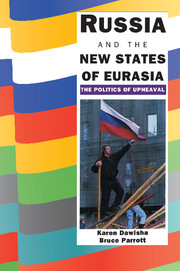Book contents
- Frontmatter
- Contents
- Preface
- Maps
- Introduction
- 1 The Legacies of History
- 2 National Identity and Ethnicity
- 3 The Impact of Religion
- 4 Political Culture and Civil Society
- 5 The Impact of Economics
- 6 Foreign Policy Priorities and Institutions
- 7 Military Issues
- 8 The Nuclear Factor
- Conclusion
- Appendix A Chronology of Events, January 1992 to October 1993
- Appendix B Compendium of Leadership and Institutional Changes in the Eurasian States, January 1992 to October 1993
- Appendix C Soviet Census Data, Union Republic and ASSR, 1989
- Notes
- Index
Conclusion
Published online by Cambridge University Press: 06 July 2010
- Frontmatter
- Contents
- Preface
- Maps
- Introduction
- 1 The Legacies of History
- 2 National Identity and Ethnicity
- 3 The Impact of Religion
- 4 Political Culture and Civil Society
- 5 The Impact of Economics
- 6 Foreign Policy Priorities and Institutions
- 7 Military Issues
- 8 The Nuclear Factor
- Conclusion
- Appendix A Chronology of Events, January 1992 to October 1993
- Appendix B Compendium of Leadership and Institutional Changes in the Eurasian States, January 1992 to October 1993
- Appendix C Soviet Census Data, Union Republic and ASSR, 1989
- Notes
- Index
Summary
The political and social upheaval in the lands of the former USSR constitutes one of the greatest historical changes of the twentieth century, combining a chaotic imperial collapse with simultaneous attempts to build new nation-states. Given the complexity of this process, no observer can pretend to foretell its outcome or its larger consequences. However, analysts can identify some of the key features of the process and the underlying factors that may push developments in the new states toward chaos or stability. In this chapter several major aspects of the Soviet Union's disintegration and post-Soviet state-building are discussed. Next this process is briefly compared with previous twentieth- century instances of imperial collapse and political realignment. On the basis of these comparisons, the chapter closes with an evaluation of the implications for the future of Russia and the other new states.
The Eurasian Upheaval as Process
One important characteristic of the upheaval taking place in Eurasia is that it is virtually certain to continue for many years. Whether judged in terms of the formation of political and legal institutions, the recasting of national economies, or the emergence of new norms of intrasocietal and government-society relations, all the new states are experiencing the kind of revolutionary transformation that has historically required decades to complete. Those countries that make a successful transition to an open, democratic, and market-oriented society integrated into the international community cannot expect to reap the full benefits for two or three decades. Almost certainly some of the countries will not complete the transformation, and a handful may not even seriously attempt it.
- Type
- Chapter
- Information
- Russia and the New States of EurasiaThe Politics of Upheaval, pp. 280 - 296Publisher: Cambridge University PressPrint publication year: 1994



